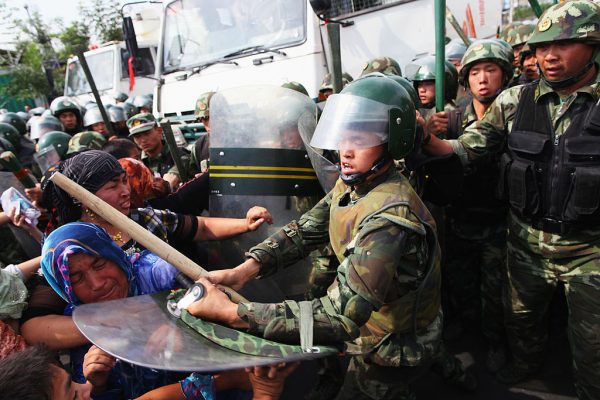The China Threat Is Nonpartisan
CommentaryThe movement by state governors and legislators from South Dakota to New York to ban the TikTok app from state phones, and the bipartisan effort to do the same by Sen. Marco Rubio (R-Fla.) and Reps. Mike Gallagher (R-Wis.) and Raja Krishnamoorthi (D-Ill.), as well as the National Development Strategy and Coordination Act bill introduced by Rubio and Rep. Ro Khanna (D-Calif.), shows that the China threat and the U.S. response should be a nonpartisan issue. The bill would work to reverse decades of offshoring U.S. manufacturing. The solutions to the vulnerabilities in supply chains—from the industrial base to personal protective equipment and pharmaceuticals—that the COVID-19 pandemic revealed are advanced in this Act. The national project to restore U.S. manufacturing leadership is urgently needed. What is positive about this development is far beyond the bill’s merits. It is bipartisanship of the Rubio-Khanna’s proposed legislation and growing moment to ban TikTok. That is a significant step forward in considering the China threat. Communist China’s rise has hurt the overwhelming number of Americans, be they Democrats, Republicans, or Independents, not only because of intellectual property theft and lost manufacturing and its impact on union households and other workers throughout the land. Beijing’s rise has given it the military capability to present a threat to the United States and its allies. The Chinese regime’s growing diplomatic influence—as witnessed most recently by Xi Jinping’s meetings in Saudi Arabia with Mohammed bin Salman and other Arab leaders—is placing considerable strain on the traditional allies and partners of the United States. But it also challenges its vision for international politics. For Americans who seek to sustain the liberal international order or even for those who seek major changes in that order, communist China’s rise is bad news. For Americans who want to sustain the current U.S. position in the world, including many in Democratic and Republican leadership, the Chinese regime is an explicit threat to it as Beijing labors to replace it with the Chinese Communist Party’s (CCP) vision of global politics, which is antithetical to freedom and Western conceptions of human rights. For progressive Democrats, the CCP’s vision is also disastrous. Chinese performance in the Global South is defined by the exploitation of people and the environment. The CCP’s treatment of its ethnic, religious, women, and sexual minorities is atrocious. Thus, were the United States to lose its dominant position, it would lose the ability to advance progressivism in global politics, including the ability to influence allies, international organizations, and even foes to adopt its principles and to be judged by them. Progressivism will acknowledge that Beijing has made no changes to its treatment of its minorities or women or cultural attitudes and racism toward darker-complexioned people. That is particularly salient at a time of the U.S.-African leader summit when a key item on the agenda was to check Chinese influence in Africa by demonstrating that the United States is a better partner in relationships with African states. Fundamentally, what is especially worrying is the CCP’s radically different ideology. This includes the deeply rooted racialized worldview of racism and Han supremacy that informs China’s domestic and foreign policies, as well as how the regime treats the non-Han. This is particularly the case for the minority groups in the country that directly or indirectly challenge Han supremacy, notably the Kazakh, Kyrgyz, and Uyghur minorities in Xinjiang. In essence, Han supremacy and even race-based and eugenicist beliefs heavily influence how the Chinese see the world. Chinese policemen push Uyghur women who are protesting in Urumqi, Xinjiang, China, on July 7, 2009. (Guang Niu/Getty Images) In fact, if China supplants the United States, the rest of the world will have to adapt to the CCP’s ideology and the norms and principles it advances. This means that those who support the present international liberal order, developed largely by Great Britain and the United States after World War II, are likely to find it more difficult to advance and defend fundamental Western liberal conceptions of free trade, individual liberty, and human rights. Equally, progressives will face far greater difficulty advancing their norms and principles. American cultural, economic, and political elites, be they supporters of liberalism or progressivism, have yet to consider fully what will be lost if, indeed, communist China were to become the world’s dominant state and just how different the world would be. Accordingly, Americans of all political stripes should unite behind a nonpartisan identification as the CCP is the existential threat to American society, economy, scientific and technological leadership, and global position. The result should be bipartisan support for strengthening A

Commentary
The movement by state governors and legislators from South Dakota to New York to ban the TikTok app from state phones, and the bipartisan effort to do the same by Sen. Marco Rubio (R-Fla.) and Reps. Mike Gallagher (R-Wis.) and Raja Krishnamoorthi (D-Ill.), as well as the National Development Strategy and Coordination Act bill introduced by Rubio and Rep. Ro Khanna (D-Calif.), shows that the China threat and the U.S. response should be a nonpartisan issue.
The bill would work to reverse decades of offshoring U.S. manufacturing. The solutions to the vulnerabilities in supply chains—from the industrial base to personal protective equipment and pharmaceuticals—that the COVID-19 pandemic revealed are advanced in this Act. The national project to restore U.S. manufacturing leadership is urgently needed.
What is positive about this development is far beyond the bill’s merits. It is bipartisanship of the Rubio-Khanna’s proposed legislation and growing moment to ban TikTok. That is a significant step forward in considering the China threat.
Communist China’s rise has hurt the overwhelming number of Americans, be they Democrats, Republicans, or Independents, not only because of intellectual property theft and lost manufacturing and its impact on union households and other workers throughout the land. Beijing’s rise has given it the military capability to present a threat to the United States and its allies.
The Chinese regime’s growing diplomatic influence—as witnessed most recently by Xi Jinping’s meetings in Saudi Arabia with Mohammed bin Salman and other Arab leaders—is placing considerable strain on the traditional allies and partners of the United States. But it also challenges its vision for international politics. For Americans who seek to sustain the liberal international order or even for those who seek major changes in that order, communist China’s rise is bad news.
For Americans who want to sustain the current U.S. position in the world, including many in Democratic and Republican leadership, the Chinese regime is an explicit threat to it as Beijing labors to replace it with the Chinese Communist Party’s (CCP) vision of global politics, which is antithetical to freedom and Western conceptions of human rights.
For progressive Democrats, the CCP’s vision is also disastrous. Chinese performance in the Global South is defined by the exploitation of people and the environment. The CCP’s treatment of its ethnic, religious, women, and sexual minorities is atrocious. Thus, were the United States to lose its dominant position, it would lose the ability to advance progressivism in global politics, including the ability to influence allies, international organizations, and even foes to adopt its principles and to be judged by them.
Progressivism will acknowledge that Beijing has made no changes to its treatment of its minorities or women or cultural attitudes and racism toward darker-complexioned people. That is particularly salient at a time of the U.S.-African leader summit when a key item on the agenda was to check Chinese influence in Africa by demonstrating that the United States is a better partner in relationships with African states.
Fundamentally, what is especially worrying is the CCP’s radically different ideology. This includes the deeply rooted racialized worldview of racism and Han supremacy that informs China’s domestic and foreign policies, as well as how the regime treats the non-Han. This is particularly the case for the minority groups in the country that directly or indirectly challenge Han supremacy, notably the Kazakh, Kyrgyz, and Uyghur minorities in Xinjiang. In essence, Han supremacy and even race-based and eugenicist beliefs heavily influence how the Chinese see the world.

In fact, if China supplants the United States, the rest of the world will have to adapt to the CCP’s ideology and the norms and principles it advances. This means that those who support the present international liberal order, developed largely by Great Britain and the United States after World War II, are likely to find it more difficult to advance and defend fundamental Western liberal conceptions of free trade, individual liberty, and human rights. Equally, progressives will face far greater difficulty advancing their norms and principles.
American cultural, economic, and political elites, be they supporters of liberalism or progressivism, have yet to consider fully what will be lost if, indeed, communist China were to become the world’s dominant state and just how different the world would be.
Accordingly, Americans of all political stripes should unite behind a nonpartisan identification as the CCP is the existential threat to American society, economy, scientific and technological leadership, and global position. The result should be bipartisan support for strengthening American industry and the security of critical supply chains, ending Wall Street’s investment in Chinese entities, particularly those associated with the Chinese military and the Muslim genocide in Xinjiang. Americans should unite behind partners, like India, that face a direct territorial threat from Beijing, including recent significant clashes along their disputed Himalayan border.
Equally, Americans should support Taiwan as a robust democracy that demonstrates daily an alternative political system for the Chinese people suffering under the rule of the CCP. As U.S. House of Representatives Speaker Nancy Pelosi’s August visit to Taipei demonstrated, both parties stand with Taiwan against the threat from Beijing. The routinization of visits from the new House leadership would be valuable, ideally in conjunction with Senate leadership as well.
While Americans possess considerable differences over which they disagree, while there are many reasons to be partisan in Washington, the China threat is not one of them. The bipartisan identification of the risks of the TikTok app and the cooperation between Rubio, Gallagher, Krishnamoorthi, and Khanna, respectively, are benchmarks for continued progress in addressing U.S. vulnerabilities in the multifaceted Sino-American confrontation. A nonpartisan threat deserves a similar response.
Views expressed in this article are the opinions of the author and do not necessarily reflect the views of The Epoch Times.












